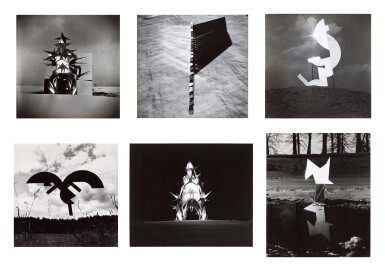Escape Artists – The Non-Conformists Online
Escape Artists – The Non-Conformists Online

Property from a Private European Collection
FRANCISCO INFANTE | SIX ARTEFACTS FROM THE SERIES GAME OF GESTURES, KOMBINATORIKA AND STRUCTURES
Lot Closed
October 1, 01:42 PM GMT
Estimate
4,000 - 6,000 GBP
Lot Details
Description
Property from a Private European Collection
FRANCISCO INFANTE
b.1943
SIX ARTEFACTS FROM THE SERIES GAME OF GESTURES, KOMBINATORIKA AND STRUCTURES
each signed and titled in Cyrillic and variously numbered and dated on the reverse
silver gelatin print
Largest print: 60 by 50.5cm, 23½ by 19¾in.; smallest print: 50 by 50cm, 19¾ by 19¾in.
(6)
Game of Gestures: executed in 1977
Kombinatorika: executed in 1981
Structures: executed in 1987
All prints from an edition of 20
To view Shipping Calculator, please click here
Acquired directly from the artist by the present owner in 1990
The present Artefacts, from various series, are part of larger group of original photographs acquired by the present owner directly from the artist’s Moscow studio in 1990 (lots 39-43). It was the beginning of a fruitful artist-collector relationship, resulting in two commissions executed in 1992 during the artist’s visit to the collectors’ homes in both Paris (the Souvenirs series, lot 44) and La Roche Jaune in Brittany (the Geometric Horizons series, lot 45) in 1992. In Infante’s artistic universe, the word artefact has multiple interpretations. In the artist’s own words, it ‘signifies an object of secondary nature, i.e. a thing made by a person and thus autonomous in its relation to nature. (…) This autonomous presentability of the artefact is important for the articulation of new artistic links between the artificial object and nature. With this artistic quality comes another reading of the artefact as an ARTfact which requires the full creative presence of the artist. Yet another understanding of the artefact is connected with tradition, with culture. Here it presents itself as an eternal symbol given as something which CANNOT BE, but is in some mysterious way occurring. In ancient cultures the artefact is a symbol of mystery (…) Where the artefact interacts with nature, a field of play develops. It acts as an organising principle – a kind of carcass or sphere, inside which one can order the attributes of nature itself: sunlight, three-dimensionality, snow, earth, the sky etc. The artist, inasmuch as he has inspired this situation, finds himself in the epicentre of the field of play.’ (Francisco Infante: Artifacts. Retropective, Moscow: National Centre for Contemporary Arts, 2004, pp.152-153).
